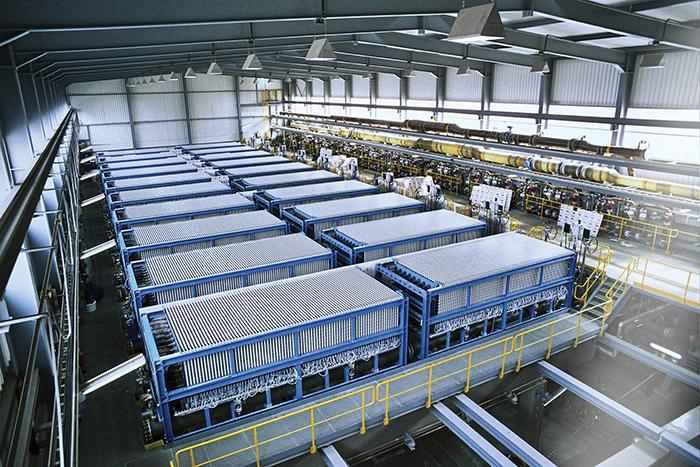Hydrogen Electrolyzer Market Intelligence: Analyzing Trends, Drivers, Challenges, and Future Growth Prospects

The hydrogen electrolyzer market has garnered significant attention as the world pivots towards sustainable energy solutions. As the global shift from fossil fuels to clean energy intensifies, hydrogen emerges as a key player in the energy transition. Hydrogen electrolyzers, which use electricity to split water into hydrogen and oxygen, are at the forefront of this transformation. This technology plays a crucial role in producing green hydrogen, a clean fuel alternative that can decarbonize industries, transportation, and power generation.
Current State of the Hydrogen Electrolyzer Market
The global hydrogen electrolyzer market is expanding rapidly, driven by increased government investments, the growing demand for clean energy solutions, and the need for carbon-neutral technologies. In 2024, the market is expected to experience substantial growth, with electrolyzers being employed not only in large-scale industrial applications but also in emerging sectors such as transportation and grid balancing.
Several factors are accelerating the market’s growth. Technological advancements have improved electrolyzer efficiency, making the production of hydrogen more cost-effective. Electrolyzers, once a niche technology, are now entering the mainstream, as more companies, especially those in the energy and automotive sectors, explore hydrogen’s potential as a clean energy source. Governments around the world have also introduced favorable policies and incentives to promote the adoption of hydrogen technologies, further boosting market demand.
Types of Electrolyzers Driving Market Expansion
The hydrogen electrolyzer market consists of various types of electrolyzers, each with distinct advantages. The primary categories include:
-
Alkaline Electrolyzers: This is the most mature and commonly used technology. Alkaline electrolyzers are highly reliable, cost-effective, and have been around for decades. They use a liquid alkaline electrolyte (such as potassium hydroxide) to facilitate the hydrogen production process.
-
Proton Exchange Membrane (PEM) Electrolyzers: PEM electrolyzers are gaining popularity due to their efficiency, compact size, and the ability to operate at variable electricity input. This makes them ideal for applications that require flexibility, such as renewable energy integration.
-
Solid Oxide Electrolyzers (SOEC): These electrolyzers are considered the next frontier in hydrogen production due to their high efficiency. They operate at high temperatures, which enables them to utilize waste heat from other industrial processes, further improving energy efficiency.
The growing interest in renewable hydrogen production is driving demand for PEM and SOEC technologies. With the increasing penetration of renewable energy sources like wind and solar, electrolyzers are becoming essential for balancing intermittent power generation and producing hydrogen for storage and transportation.
Market Opportunities and Challenges
The hydrogen electrolyzer market presents numerous opportunities. First, there is a rising demand for clean hydrogen across several industries, including steel, chemical manufacturing, and transport. The aviation and shipping industries, in particular, are exploring hydrogen fuel as a viable alternative to reduce carbon emissions from heavy-duty transport.
Another significant opportunity lies in green hydrogen production. Green hydrogen, produced through renewable electricity-powered electrolyzers, is gaining traction as a solution to decarbonize industrial processes and replace fossil fuels in areas where electrification is difficult. This presents an immense growth opportunity for hydrogen electrolyzer manufacturers.
However, the market faces challenges related to cost competitiveness. Hydrogen electrolyzers are expensive, and the production of hydrogen through electrolysis remains more costly than other methods. To overcome this barrier, ongoing research and development efforts focus on improving the efficiency of electrolyzers and reducing the costs associated with manufacturing and operation.
Additionally, scaling up the deployment of hydrogen infrastructure and ensuring access to low-cost renewable energy are crucial factors in supporting market growth. Collaboration between governments, private companies, and research institutions is essential to address these challenges and unlock the full potential of the hydrogen electrolyzer market.
Key Players in the Hydrogen Electrolyzer Market
The hydrogen electrolyzer market is competitive, with several key players leading the charge in technological advancements and market expansion. Prominent companies include:
- Nel ASA: A Norwegian company specializing in hydrogen production and fueling solutions. They are at the forefront of PEM electrolyzer technology.
- ITM Power: Based in the UK, ITM Power designs and manufactures PEM electrolyzers for various applications, including industrial hydrogen production and energy storage.
- Siemens Energy: A global leader in energy solutions, Siemens Energy is actively involved in developing green hydrogen production technologies, including alkaline and PEM electrolyzers.
Other notable players include Plug Power, McPhy, and Cummins, all of which are making strides in advancing hydrogen electrolyzer technologies and expanding their market presence.
Future Outlook
The hydrogen electrolyzer market is poised for substantial growth as governments and industries worldwide increase their commitment to sustainability. With ongoing technological advancements, declining costs, and rising demand for green hydrogen, the electrolyzer market is set to become a cornerstone of the global clean energy transition. The continued development of electrolyzer technologies, combined with supportive policies, will help drive down costs and unlock the potential for widespread adoption.
Conclusion
In conclusion, the hydrogen electrolyzer market is experiencing rapid growth due to the increasing demand for clean hydrogen and the push toward decarbonization. As governments, industries, and research institutions collaborate to overcome challenges and scale up the deployment of electrolyzer technologies, the market is well-positioned for long-term success. The transition to hydrogen as a clean energy source is becoming a critical part of the global energy landscape, and electrolyzers will play a vital role in realizing this future.
- Art
- Causes
- Crafts
- Dance
- Drinks
- Film
- Fitness
- Food
- Juegos
- Gardening
- Health
- Home
- Literature
- Music
- Networking
- Other
- Party
- Religion
- Shopping
- Sports
- Theater
- Wellness


